When using a VPN, it’s logical that you expect the highest level of privacy and security. In today’s day and age when surveillance and cyberattacks are at their highest, it’s vital to protect your data and remain anonymous online.
Unfortunately, not all VPNs are going to give you this commodity, and despite having a “VPN” in their name, many of them resort to data collection, which they further sell to third parties. However, the selection of the best no-log VPNs isn’t small.
No-log providers store absolutely no logs of identifiable information, such as IP address, DNS requests, browsing history, and geolocation. As such, they represent the pinnacle of privacy and security, especially if there are independent audits involved.
It seems hard to find the best anonymous VPN in 2025. But if you have a bit of experience as I do, you can easily recognize one from afar. Besides, the providers that I’ll talk about have a great track record of storing zero logs, so you can be sure the selection is par excellence.
Top no-log VPNs of 2025 :
- ExpressVPN
- CyberGhost
- NordVPN
- Surfshark VPN
- PIA VPN
7100 servers
118 covered countries
30 days money-back guarantee
10 simultaneous connections
9.8 /10
3000 servers
105 covered countries
30 days money-back guarantee
8 simultaneous connections
9.4 /10
12000 servers
100 covered countries
45 days money-back guarantee
7 simultaneous connections
9.2 /10
Best No-Log VPN for 2025: The Top 5 Providers
If you want to remain anonymous online, having a quality provider that isn’t logging any identifiable data is crucial. The best choices for something like this are premium providers, as they earn money from subscriptions and they don’t need to sell your data to persevere. Let’s check them out together.
1. ExpressVPN
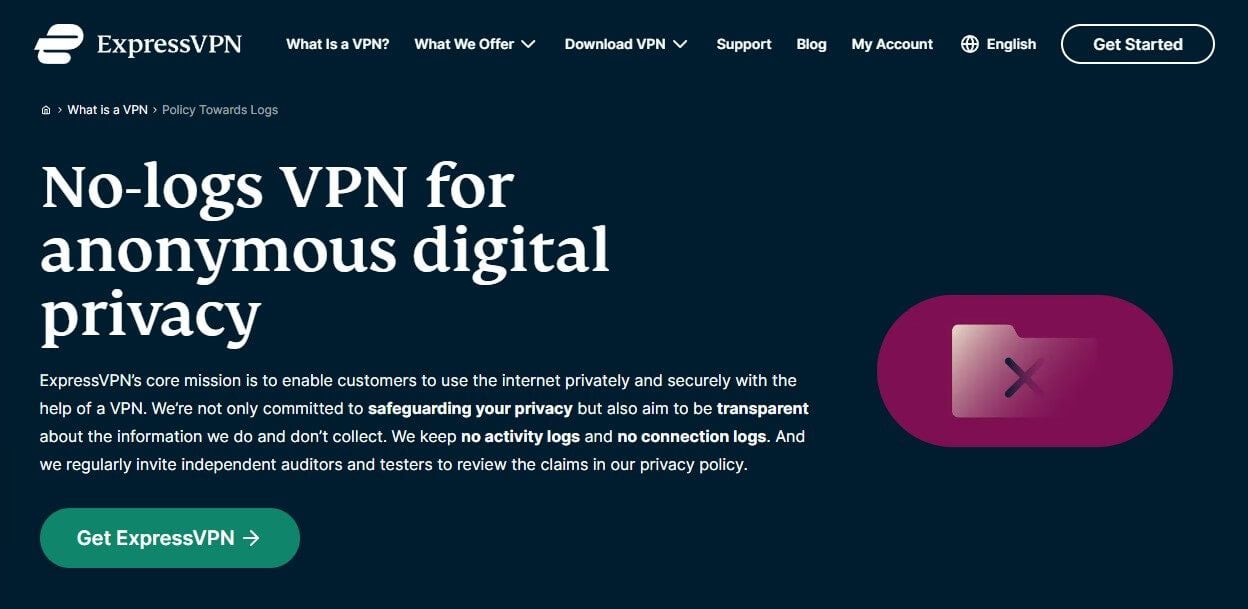
The best no-log VPN in 2025 is ExpressVPN and I think we already knew that. The provider is based in the British Virgin Islands, which is an off-shore location known for the highest level of privacy. The company is, therefore, away from the 5 Eyes countries and as such, it’s not obligated to store logs.
If you check its privacy policy, you’ll see that ExpressVPN keeps very few logs. It won’t store data like IP address, DNS queries, traffic destination or metadata, your location, browsing history, and other relevant information. This is further proven by an external audit.
PricewaterhouseCoopers, Cure53, and KPMG, some of the largest auditing firms, made sure to inspect every aspect of ExpressVPN and confirm these claims. After examining its complex infrastructure and servers, they concluded that this is a true no-log VPN.
That’s not all, as ExpressVPN proved many times that it keeps no user data on its servers. After the assassination of Andrei Karlov, Turkish authorities found no data on ExpressVPN’s servers in Turkey, which is both good and bad because of its tragic death.
Besides, ExpressVPN uses RAM-based servers which it calls TrustedServer technology. Upon each restart, all collected data on the server is wiped clean because of the way RAM works. When there’s power, RAM keeps information. When it’s restarted or shut down, all information is lost.
ExpressVPN, on top of everything, has its proprietary DNS, preventing third-party DNS services from interfering with your privacy. With features like 256-bit AES encryption, an automatic kill switch, and the Lightway protocol, this is a perfect VPN for those seeking privacy.
This privacy has its price, which is a tad higher than other providers on the list. However, its 49% discount and 3 free months for the annual plan make this provider a lot more affordable. Coupled with a 30-day refund period, it’s easy to try ExpressVPN risk-free for 30 days without losing any money!
Pros
- Based in the British Virgin Islands
- Certified no-logging policy
- TrustedServer technology
- Proprietary DNS servers
- IP/DNS leak protection
- 256-bit AES encryption
Con
- It could be a bit more affordable
2. CyberGhost
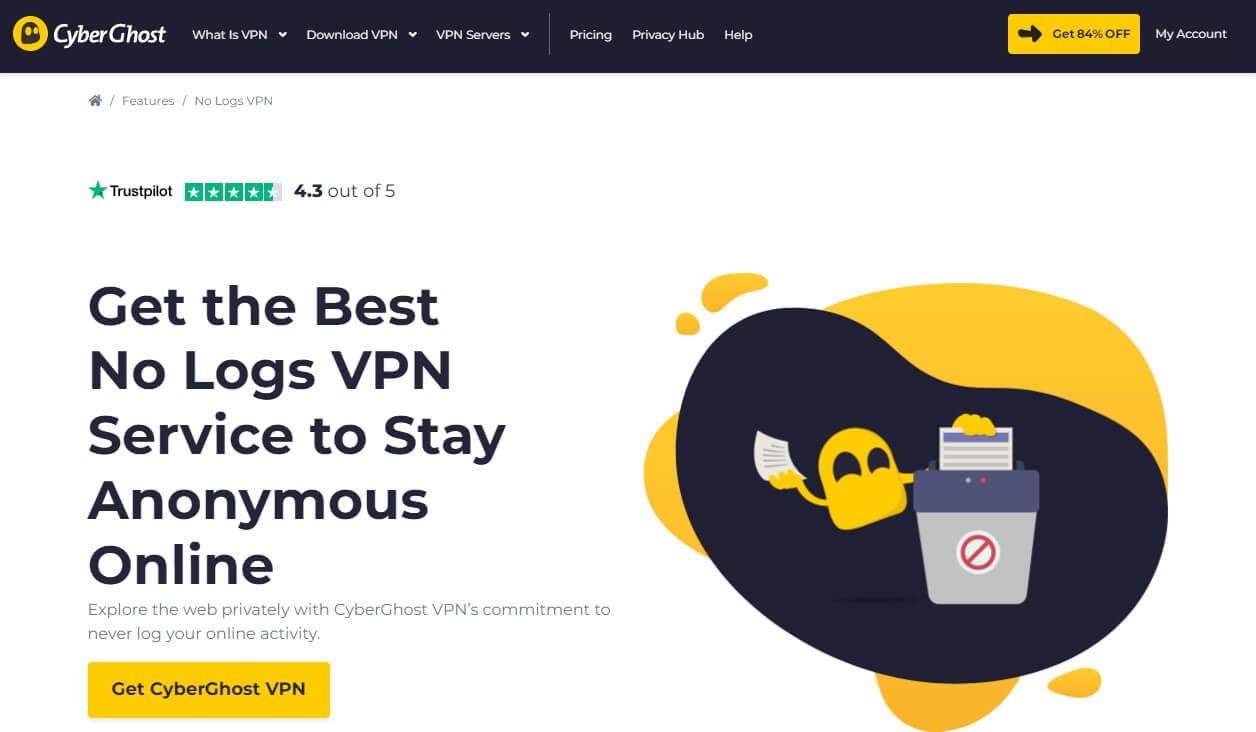
CyberGhost is also one of the best VPNs to stay anonymous online given its Romanian jurisdiction, which, once again, resides outside of the 5 Eyes alliance.
This provider is known for a zero-logging policy and minimal logging that will help you stay private online. Aside from anonymized technical data that’s necessary for the service to function, CyberGhost stores no logs of your browsing history, DNS/IP address, or other identifiable data.
However, the highlight of this provider lies in transparency reports. CyberGhost publishes transparency reports every 3 months, outlining each DMCA complaint, malware activity flag, and police request. In addition, transparency reports let you find out more about the company.
You can see its statistics and even get to know more about its team. In fact, the company is so transparent that it’ll show you its employees and some company facts. Plus, the provider has NoSpy servers. They’re located in Romania and are independently operated by CyberGhost.
Connecting to them grants the highest level of privacy and anonymity for those wanting to use the VPN in a country like the UK, which is inside the 5 Eyes. The provider uses servers based on RAM as well and it has a private internet browser that you can download for free.
CyberGhost has a security audit from Deloitte, which makes it very trustworthy. Let’s also not forget that transparency reports showed that it really stores no logs and never gives out any identifiable information to the authorities – once again because it doesn’t store any!
CyberGhost is extremely cheap and I think people will go nuts about it. Its longest plan is incredibly affordable and comes with a 45-day money-back guarantee with no conditions. For a true no-log VPN, this is a deal you don’t want to miss!
Pros
- Transparency reports add to trustworthiness
- Audited by Deloitte
- It’s based in Romania (outside of the 5 Eyes)
- RAM-based, 10 Gbps servers
- Offers a free Private Browser for anonymous browsing
- It has a very affordable 2-year plan
Con
- A bit complicated Windows app
3. NordVPN
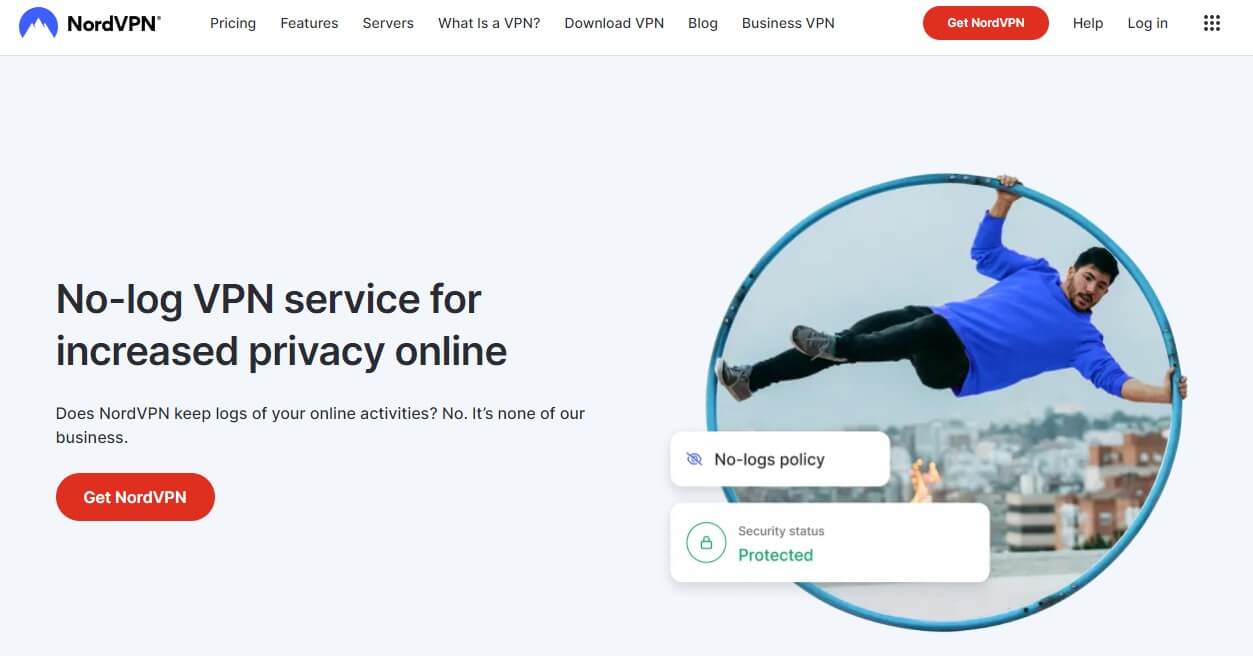
NordVPN is one of my favorite choices for remaining anonymous online. This no-log VPN has everything you need to enjoy the internet without snoopers and hackers breathing behind your neck. Starting with its no-logs policy – it’s pretty much perfect!
NordVPN stores no logs of information that could be traced back to you. With only minimal technical data for maintenance and providing service, this provider will keep your privacy intact. Not only that, but the provider has not one but TWO security audits from PricewaterhouseCoopers and Deloitte.
These auditors went through NordVPN’s infrastructure to find weaknesses, only to conclude that the VPN is one of the safest providers on the market. Despite its security breach in 2018, NordVPN’s users didn’t suffer any consequences which isn’t strange considering its no-logging practices.
After 2018, NordVPN improved its security even further, when one of its external audits happened. Security-wise, NordVPN is one of the best anonymous VPNs. Aside from bank-grade encryption, this provider has RAM-based servers and an in-house DNS server for keeping things confidential.
Moreover, it offers Dark Web Monitor which will inform you if your personal data surfaces on the web. Its Threat Protection feature defends you against malware and viruses, while Meshnet lets you join and host secure LAN parties if you’re into gaming with a VPN or talking about business anonymously.
Lastly, NordVPN is based in Panama and once again, this is an off-shore location with a huge focus on privacy. This means that the 5/9/14 Eyes influence is non-existent and the provider isn’t obligated to store any logs or share them with the authorities.
We’re talking about a fairly affordable provider but keep in mind VAT (value-added taxes) that can increase the price in some countries. The silver lining is that, even in this case, it’ll be affordable, and there’s a 30-day money-back guarantee for all plans.
Pros
- Two audits from PwC & one from Deloitte
- Minimal logging practices
- Dark Web Monitor
- It’s based in Panama (an off-shore country)
- Offers an in-house DNS server
Cons
- Value-added taxes in some countries
- Security breach in 2018
4. Surfshark
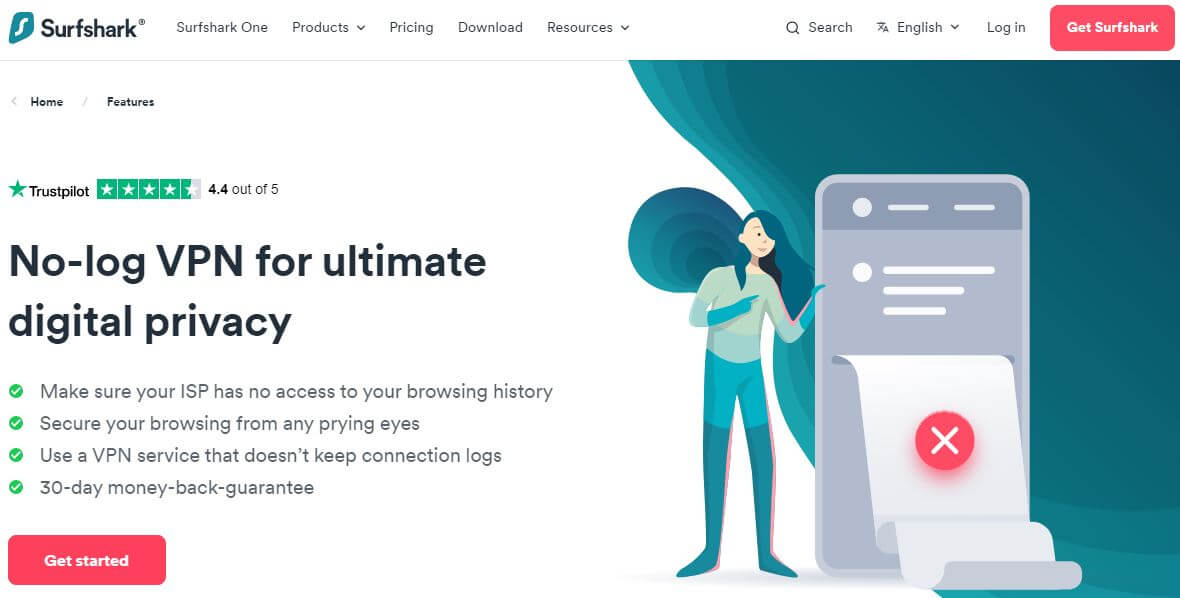
Surfshark is a feature-rich VPN that comes with reasonable pricing and affordable long-term plans. While its unlimited simultaneous connections and great streaming capabilities are very prominent, its security and privacy are two very important aspects.
Namely, Surfshark is based in the Netherlands – different from the British Virgin Islands it was based in before. Therefore, we can say all the best about this provider which isn’t shy of displaying its privacy policy publicly and bragging about third-party audits from Deloitte and Cure53.
Anyway, Surfshark stores zero logs of used bandwidth, network traffic, connection timestamps, IP addresses, and browsing history. Much like other providers on the list, its logging is minimal and consists of logs that are necessary to keep the service functioning.
Beware that Surfshark uses RAM servers, so even this anonymized information is deleted with each restart. Furthermore, Surfshark offers a huge selection of protocols and comes with IPv6/DNS leak protection which adds to the overall security further.
So far, Surfshark never leaked any user-related information and it never shared any information with government bodies, as it has none. Also, it’s vital to talk about its “Incogni” solution, which deletes your personal data from the market.
This, combined with a no-logging policy and security measures, makes it easy to stay anonymous online while using this best no-log VPN. Although some users complained about its kill switch that something fails to work, we can assure you these issues are few and far between.
Besides, Surfshark is very affordable and its 2-year plan can be purchased at well under $3 a month. Don’t forget a 30-day refund period that permeates all plans, which allows you to test it risk-free and get a refund if you’re not satisfied – which most likely won’t be the case.
Pros
- Audited by Cure53 and Deloitte
- A big selection of VPN protocols
- Unlimited simultaneous connections
- IPv6/DNS leak protection adds to privacy and anonymity
Cons
- The kill switch sometimes won’t work
- Average performance
5. Private Internet Access
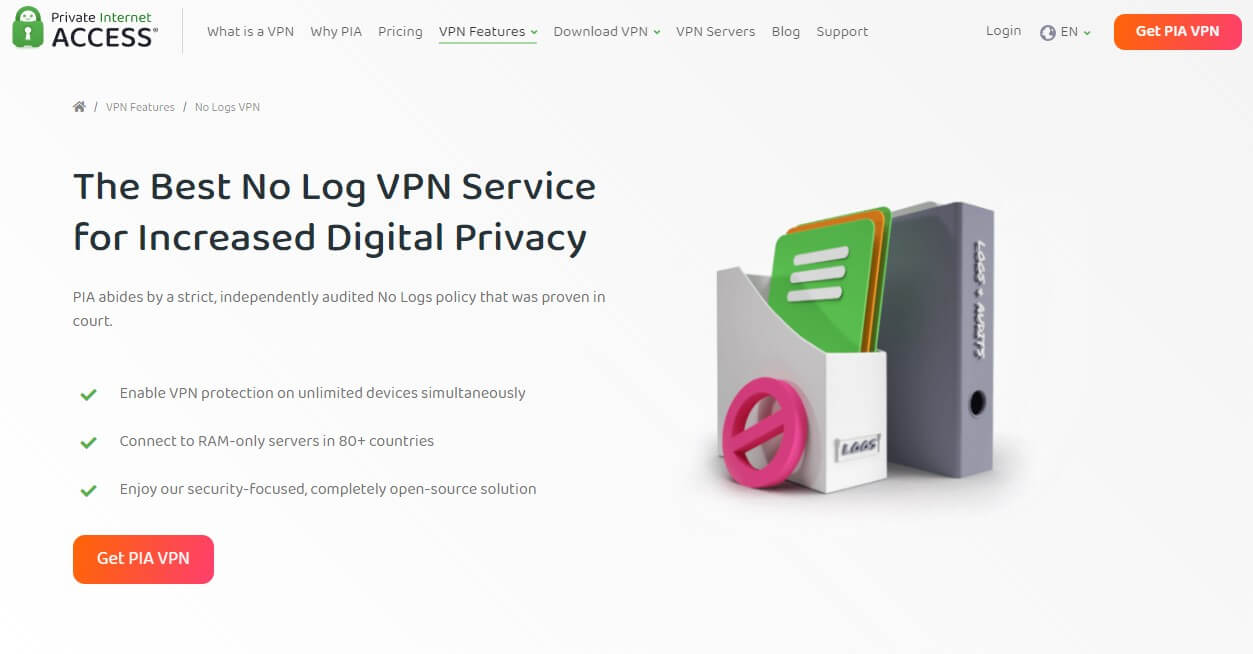
The last no-log VPN that I want to discuss is Private Internet Access or PIA. PIA is contradictory to everything I said about other providers but that’s not entirely true. It’s based in the United States, a founding member of the 5 Eyes, and probably the worst jurisdiction for privacy.
However, in spite of its American background, PIA has one of the best no-logs policies and even transparency reports in the same fashion as CyberGhost! Is it a good CyberGhost alternative? Well, you could say that because it’s even cheaper when talking about long-term plans.
Privacy-wise, this provider’s privacy policy is pretty clear. It stores zero logs of your IP address, browsing history, and DNS requests, and its mandatory logs are minimal, serving only one purpose – maintaining and upgrading its services.
Private Internet Access has a third-party audit from Deloitte as well, which speaks volumes about the quality of this VPN. Not only that but the provider was brought to court several times, as the authorities tried getting some user-related information about it.
However, each time they probed PIA, they found nothing useful on its servers, which, for good or bad, didn’t help the authorities in their criminal investigations. Private Internet Access has tons of advanced features where you can fully customize your experience.
You can choose from several DNS options and even use its proprietary DNS. PIA MACE is another great feature for blocking ads and malicious sites, and its WireGuard support ensures great performance, with 256-bit AES encryption safeguarding your privacy.
PIA isn’t the most polished provider and has sluggish desktop apps. It’s not great for streaming either, but if you’re looking for the best anonymous VPN, this might be one. I recommend its cheapest 2-year plan with a 30-day money-back guarantee that makes this provider a great value for money.
Pros
- Very cheap long-term plans
- Its no-logging policy has been proven in court a few times
- A security audit by Deloitte
Cons
- Sluggish desktop app
- Not the best choice for streaming
What Does a No-Log VPN Mean?
When we say that a VPN stores no logs, it never means exactly that. Many people who don’t understand this concept will be alarmed when they see that a VPN stores information like your used payment method, email address, and used bandwidth.
Yet, these logs are pretty much mandatory, especially your email address and payment info because you need to renew your subscription and pay for the service. However, this information is kept in an anonymized form by no-log VPNs, so it’s not available to anyone.
Also, this information is benign and it can’t be used by the provider or anyone else to track your online activities. Some logs are mandatory for services to function, especially when we talk about parameters like used bandwidth and application logs.
Used bandwidth is necessary for VPNs that impose bandwidth limits, for example. They must know how much bandwidth you used to impose a limit – logical, right? Also, application logs are useful for knowing unsuccessful connection attempts that can be further analyzed and fixed.
In many cases, providers store this data in an anonymized form and for a limited period, after which, it’s deleted and never seen again. VPNs will also use cookies to track your activities on their sites, which is needed for obvious purposes – to see how potential customers interact with their websites.
Let’s take ExpressVPN as an example. This provider has a certified no-logging policy, yet, it stores info about used bandwidth per day and dates of connection to a VPN service. This information is used for troubleshooting, providing technical support, and identifying potential issues.
Type of Malicious VPN Logs
Now that I explained that even a no-log VPN must store some data to work properly, let’s talk about data that it SHOULD NOT store. Storing these bits of information is dangerous to your privacy and it can be traced back to you either by the provider or the government body or hacker that seizes this information.
Connection Logs
Connection logs are pretty common and are kept by many VPNs. Are they necessarily bad? Well, they usually are, but it all depends on the reason for storing this data and the company’s reputation. What exactly are connection logs?
Simply put, this is the information that your provider can use to find out your IP address or even an IP address given by the VPN server. Connection logs are related to your VPN sessions where the provider can even collect timestamps and the length of your connection.
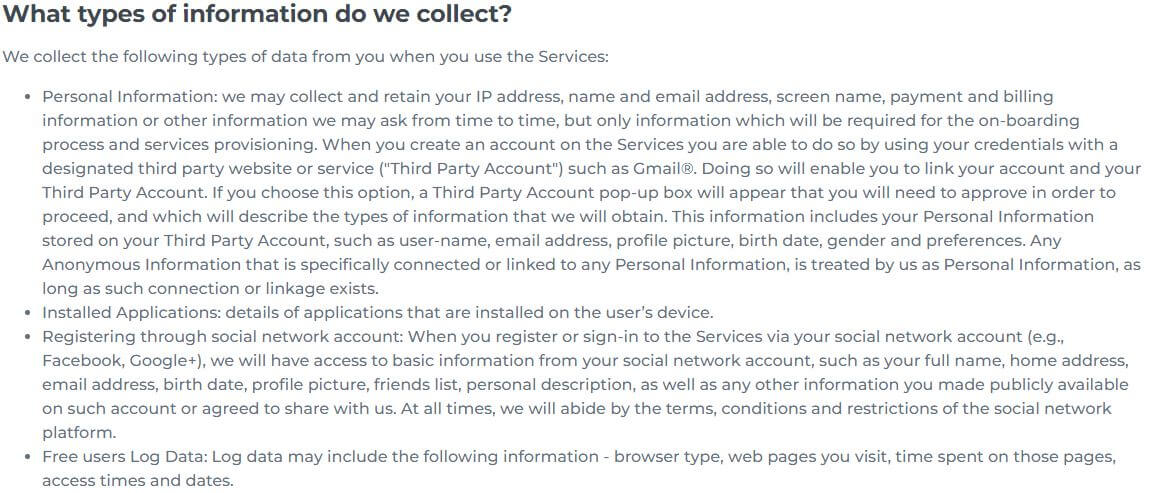
Some providers go as far as collecting the exact moment of starting and ending your connection to a server. Also, some more intrusive providers tend to store info about which protocol you used, which, I think, is too much and shouldn’t concern providers.
None of the VPNs on the list will store this information, so you can be sure that everything you do while connected to a server is anonymous.
Personal Information Logs
For me, a zero-log VPN shouldn’t store personal information about its users. This information allows the provider or a third-party company working with it to identify you fully, which puts your privacy in jeopardy.
By personal info, I think about your IP address, geolocation, device identifiers, passwords, social media credentials, credit card details, physical address, and anything similar. Hola VPN is notorious for storing this amount of data, which is why it’s one of the worst providers you can get.
The providers we talked about in the top 5 above, however, store none of this information and they have no idea of your identity, whereabouts, or what you’re doing online.
User Activities Logs
Speaking of doing stuff online, let’s talk about activity logs. Activity logs are extremely dangerous if you’re looking for a VPN for BitTorrent or engaging in P2P activities. It’s also dangerous if you’re using Tor to browse the dark web where you need complete anonymity.
Why?
Simple because activity logs mean that the provider stores information about your browsing history! In other words, it sees everything you do online and collects this information on its servers. Then, if the authorities ask the provider to hand out this information, you can be in trouble.
Something like this happened with providers like HideMyAss and PureVPN. Both providers claimed to have a no-logging policy but their cooperation with the FBI helped to arrest a few criminals. Not that this is bad or anything – criminals should be brought to justice!
However, seeing that a no-log VPN actually HAS this information on its servers is discouraging. That’s why third-party audits are important for ensuring that providers stay true to their claims.
Are There Any Free No-Log VPNs?
People looking for the best free anonymous VPNs will most likely have their expectations trumped by reality. Free providers like Hola VPN, Betternet, Hotspot Shield, NinjaVPN, and many others, are known for intrusive logging and not caring too much about your privacy.
In reality, free providers give you a lower level of security and they lack some important features that premium providers have. Moreover, many of them lack a kill switch, which can often result in unwanted IP leaks if the connection breaks.
Free providers also earn no money from subscriptions and that’s why they collect personal data – to be able to sell it to the highest bidder. However, I can recommend to you one free provider I use from time to time that stores absolutely no logs. That’s ProtonVPN.
ProtonVPN offers a 100% free version with no bandwidth limits. On top of that, it offers plenty of security features, even including WireGuard, split tunneling, and an automatic kill switch. It has a no-logging policy too and it’s verified by SEC Consult in an in-depth examination.
ProtonVPN stores no activity, connection, or personal info logs, making it a perfect choice for staying anonymous on the internet. On the other side, it’s pretty slow, offers just three server locations, and is a bad choice for streaming and torrenting.
In fact, why don’t you check my ProtonVPN review? I talk more about it but with a focus on the paid version which is a solid choice as well.
Summary
Having the best no-log VPN in 2025 is a splendid way of protecting your online privacy and ensuring safe and anonymous browsing. When choosing one, make sure you get one of the providers from our list, as these are trusted services that have a long track record of success.
If you decide on ExpressVPN, CyberGhost, or any other provider, you can rest assured knowing that your personal info, browsing history, location, and IP address are completely private and known only to you.
In a world of online surveillance, hackers, and snoopers looking to steal personal data, VPNs like these are a sight for sore eyes. After all, they’re inexpensive, and for as low as $2/mo, you can protect your online identity and stay off the radar of malicious companies and advertisers!
FAQ
Having said everything, it’s time to answer a few more questions we haven’t addressed so far.
What is the cheapest VPN that keeps no logs?
On the market, you’ll find a heap of cheap VPNs that keep logs. They do this so they can sell your sensitive information and be able to earn a bit more money. Our list is mainly populated by cheap options that, as you can see, keep no logs.
If we were to recommend the most affordable no-log VPN, that would be CyberGhost. It’s not cheaper than PIA, let’s say, but it’s the best out there for this price. The provider has a third-party audit with transparency reports but most importantly, it hasn’t got a single data breach or data leak.
Can Surfshark be trusted since it changed its jurisdiction?
This has been a frequent question since the provider announced its jurisdiction change. Surfshark was based in the British Virgin Islands, an off-shore location with excellent privacy laws. A few years ago, the provider’s legal jurisdiction became the Netherlands, which raised quite a few concerns.
The Netherlands is part of the 14 Eyes, after all, which makes the whole problem even more resounding. Well, you don’t have to worry about that. Surfshark kept its no-logging business model intact and even received an additional audit AFTER switching to the new jurisdiction.
That said, in spite of being a Netherlands-based VPN, you can still rely on it to preserve your privacy. Have you heard about a single leaking incident by Surfshark? We neither – that’s why it’s still trustworthy!
Which VPNs to avoid if I want a no-log VPN?
The list is too long but let’s just say free VPNs. You don’t want to use 100% free VPNs that offer everything with no limits i.e. Hola VPN. But Hola VPN isn’t the only VPN that keeps logs. We’re talking about Hotspot Shield, Betternet VPN, Urban VPN, and hundreds more.
We also advise not to use mobile-only VPNs as they’re the worst in this regard. Pretty much ALL free VPNs for mobile phones will store logs. If you must use a free provider, try ProtonVPN, Atlas VPN, or PrivadoVPN – these 3 are proven to be safe and secure.
Besides, before using a VPN, make sure you check its privacy policy. If you smell something stinky or see anything suspicious, don’t bother with it. If something sounds too good to be true, then it’s not true!